Apples are not what they used to be
Adelina Marini, March 29, 2011
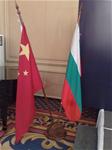 In Bulgaria we are so much absorbed by internal problems that we rarely look outside - what is going on around the world, except the news about the conflict in Libya and the disaster in Japan. Precisely for this reason, the growing up of China in the last 20 years remained somewhat unnoticed in Bulgaria. This is why I expected with great interest the lecture of Chinese Deputy Minister of Foreign Affairs Fu Ying, held in Sofia thanks to the Atlantic Club in Bulgaria. I was not sure what to expect - after all, I thought, this is the deputy minister of foreign affairs of the second largest economy in the world; the representative of a country which managed to merge capitalism and communism; the country which has no personal attitude towards human rights; the country with a gigantic market and fast growing hunger for energy resources.
In Bulgaria we are so much absorbed by internal problems that we rarely look outside - what is going on around the world, except the news about the conflict in Libya and the disaster in Japan. Precisely for this reason, the growing up of China in the last 20 years remained somewhat unnoticed in Bulgaria. This is why I expected with great interest the lecture of Chinese Deputy Minister of Foreign Affairs Fu Ying, held in Sofia thanks to the Atlantic Club in Bulgaria. I was not sure what to expect - after all, I thought, this is the deputy minister of foreign affairs of the second largest economy in the world; the representative of a country which managed to merge capitalism and communism; the country which has no personal attitude towards human rights; the country with a gigantic market and fast growing hunger for energy resources.
And, honestly, I expected to see a dandyish party functionary, with haughty behaviour, speaking Chinese, who would explain the greatness of the Chinese model. Nothing even close to that. Her Excellency Fu Ying is a woman in her 50ies, dressed simply, impressively amiable and smiling, speaking a very good English. Her lecture took place in the Sheraton hotel in Sofia, where the not very small hall was full of people wishing to hear China's message. Also impressive was the presence of the numerous employees of the Chinese embassy in Sofia. Yet in the hotel lobby a lot of Chinese books in English and Russian were offered to the audience - from the structure of the Chinese state to Chinese wisdom, China's efforts in the fight against climate change and human rights.
I took several with me fully aware that I will squander a serious amount of money from the family budget, but it appeared afterwards that the books were for free. Later I was to learn from Ms Fu Ying that China is suffering from a serious cultural misunderstanding - especially to the West - and probably this is the reason why the country is investing so much resources in dissemination of its vision about the world and the spirit (the latter, from Chinese point of view, is very important).
What happened to the juicy Bulgarian apples?
Ms Fu started her concise and general lecture with the introduction that she was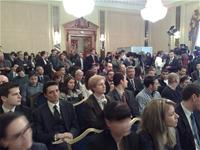 visiting Bulgaria for the second time. The first time was some 30 years ago when, working at the Chinese embassy in Bucharest, she spent a weekend in our country. She said she was amazed by the myriad of apple trees along the road, heavy with rape, juicy fruit. Her Excellency was so vivid in her description of the apples that one wishes to have a bite from the first apple seen. Her chance came 3 decades later.
visiting Bulgaria for the second time. The first time was some 30 years ago when, working at the Chinese embassy in Bucharest, she spent a weekend in our country. She said she was amazed by the myriad of apple trees along the road, heavy with rape, juicy fruit. Her Excellency was so vivid in her description of the apples that one wishes to have a bite from the first apple seen. Her chance came 3 decades later.
"When I arrived in Bulgaria on Saturday [March 19th] I had my first taste of a Bulgarian apple, waiting for thirty years. Maybe I could be honest with you - the taste wasn't as I expected. Maybe they were imported?", Ms Fu finished with a telling question.
China starts its revolutionary reforms 30 years ago, which is 10 years earlier than Eastern Europe, she continued, and a lot of what was planned back then is now achieved. Hunger is no longer a problem in China and even some restriction of sales of cars must be considered, because the world's most famous bicycle capital Beijing is now full of cars and almost no bicycles.
Is the Chinese the second largest economy of the world?
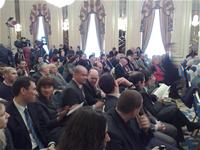 Nearly a month ago a big news was announced - that China has outpaced Japan and is now the second largest economy in the world. A fact which is being successfully used by the United States to remind Beijing of the responsibilities of such a prestigious position. From the Fu Ying's words it becomes clear that China will not change its main argument against being defined as a developed economy. If taken into account the GDP in general, China indeed is the second largest economy. More showing, however, is the index gross domestic product per capita. And it is, according to Ms Fu, still lower even that of Bulgaria (again quite a telling remark). This is why China insists that it is still a developing economy whose main target, outlined in the new five-year plan, is to increase GDP per capita.
Nearly a month ago a big news was announced - that China has outpaced Japan and is now the second largest economy in the world. A fact which is being successfully used by the United States to remind Beijing of the responsibilities of such a prestigious position. From the Fu Ying's words it becomes clear that China will not change its main argument against being defined as a developed economy. If taken into account the GDP in general, China indeed is the second largest economy. More showing, however, is the index gross domestic product per capita. And it is, according to Ms Fu, still lower even that of Bulgaria (again quite a telling remark). This is why China insists that it is still a developing economy whose main target, outlined in the new five-year plan, is to increase GDP per capita.
And as it is inherent to the Asian culture (to use allegories), Fu Ying gave another example to illustrate why was it important to take into account GDP per capita. Because, she said, our cake is as big as Japan's, but theirs has to be divided to 130mn pieces while ours to 1.5bn pieces. This is why China would focus on expanding domestic market and will make a transition from quantitative to qualitative economic growth. This is especially important against the backdrop of China's glory of being a producer of cheap, but low-quality goods.
With the increase of the size of the middle class, it is obvious that the economy can no longer be run by cheap labour. Precisely the increase of the middle class is the reason for significant pressure on the property market, from where the first signals of overheating of the Chinese economy came along. As a result of growing property bubble, the Chinese government undertook measures and introduced a programme for subsidised homes. As Ms Fu explained, more and more young people from smaller areas move to the big cities to look for work. They cannot afford a home which is why the government deems that the system of subsidised homes would solve the problem.
And as if expecting to receive criticism for this state interference on the market, 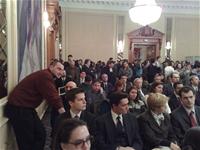 Fu admitted that, yes, maybe this is a some kind of going back to the planned economy but after all such a programme is being applied in Britain too. And one more interesting thing - China is testing not only scientific things in a lab, she added, with which she obviously meant that China would continue in the future to test new social economic models, but will never recognise the Western market economy model.
Fu admitted that, yes, maybe this is a some kind of going back to the planned economy but after all such a programme is being applied in Britain too. And one more interesting thing - China is testing not only scientific things in a lab, she added, with which she obviously meant that China would continue in the future to test new social economic models, but will never recognise the Western market economy model.
Responding to an euinside question what measures are being undertaken to prevent Chinese economy's overheating, Her Excellency explained that aside from the measures on the property market, the government in Beijing is trying to respond to the concern of the Chinese from the high prices, especially to problems of low-income people. The property market, however, is a cause of concern because if it would crush, it would drag the entire economy down, the deputy Chinese foreign minister added.
By the way, on the question about the second place of Chinese economy in the world, Fu Ying said something quite impressive. She told the audience that anytime she spoke publicly she pointed out that the United States were number one in the world and would ask who was number 2. It appears that in most of the cases the Chinese respond that not the United States but Russia or Germany are the number one in the world. Probably this is the reason why, regarding peace and prosperity, Fu Ying quoteed remarks of Russian PM Vladimir Putin during his visit in France. Nonetheless, she says the Germans are number one. China is learning a lot from them.
The EU is a partner of ours in terms of conception of the world
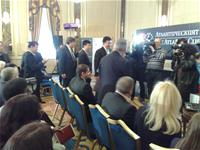 Very impressive was the absence of the United States in Fu Ying's lecture, but instead the deputy foreign minister of China spoke really strongly about China's partnership with Europe. The European Union is an important partner of China for one very important reason - both blocks argue for multilateralism and not about unipolarism, Ms Fu said. There are many issues of mutual interest - multilateralism, climate change and economic cooperation. China's 12th five-year programme has many things in common with EU's 10-year strategy for economic development - Europe 2020, Ms Fu Ying added. But still, why Europe and not the US? Except from the already mentioned reasons, Ms Fu added one more: "China treats the EU as an equal partner. We also hope EU will treats China as equals".
Very impressive was the absence of the United States in Fu Ying's lecture, but instead the deputy foreign minister of China spoke really strongly about China's partnership with Europe. The European Union is an important partner of China for one very important reason - both blocks argue for multilateralism and not about unipolarism, Ms Fu said. There are many issues of mutual interest - multilateralism, climate change and economic cooperation. China's 12th five-year programme has many things in common with EU's 10-year strategy for economic development - Europe 2020, Ms Fu Ying added. But still, why Europe and not the US? Except from the already mentioned reasons, Ms Fu added one more: "China treats the EU as an equal partner. We also hope EU will treats China as equals".
Asked by euinside about the situation with Sino-American relations, Her Excellency explained that these relations are a priority for Beijing. Nevertheless, the differences between the two countries still are significant, which became clear during Chinese President Hu Jintao's visit in Washington earlier this year. Regarding fears  that China's growing economic influence is a threat, Fu Ying recalled that China had no ambition to be the only leader of the world, on the contrary - China is striving for a world of partnership. "The US is thinking they rule the world. We go to Iraq, Afghanistan to do business and we do not carry weapons with us", Ms Fu added.
that China's growing economic influence is a threat, Fu Ying recalled that China had no ambition to be the only leader of the world, on the contrary - China is striving for a world of partnership. "The US is thinking they rule the world. We go to Iraq, Afghanistan to do business and we do not carry weapons with us", Ms Fu added.
Know China in order to love him
In fact a serious message in Fu Ying's lecture was that the lack of understanding and knowledge of China was making people draw wrong conclusions. This message was very clear in Fu's opinion about the events in North Africa. She said that the countries in the region recently got rid of colonialism and they are yet to build their institutions. China is against military intervention there, because "in China we have a saying - even if we think that the fruit tree is growing slowly, if we start pulling it, we will destroy it". She did not miss to note that, after all, until very recently the West accepted Muammar Gaddafi as an equal partner and asked what made them now so abruptly to change their opinion?
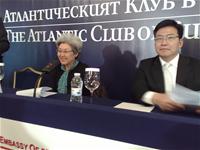 Ms Fu gave an example of the long time which Europe had to realise what she needed after the devastating wars on the continent. The people in North Africa also need time to choose their path. "Sometimes it is very difficult to communicate with the West", the Chinese deputy foreign minister says, "because they think that theirs is right and if you do not fit in their visions, then you are wrong".
Ms Fu gave an example of the long time which Europe had to realise what she needed after the devastating wars on the continent. The people in North Africa also need time to choose their path. "Sometimes it is very difficult to communicate with the West", the Chinese deputy foreign minister says, "because they think that theirs is right and if you do not fit in their visions, then you are wrong".
Fu Ying was attacked by a professor in philosophy who presented himself as a representative of Taiwan's interests in Bulgaria - a sensitive topic for China. He directly asked the guest why China did not allow Taiwan to have its own embassies around the world. In her turn, with a subtle sense of humour and that philosophically too, Ms Fu replied that the issue indeed was existential and philosophical, but after all Taiwan was part of China which was why it cannot have own embassies. According to her, China and the breakaway province had their responsibilities to the forefathers - we live under the same roof, we might not open the door between us, this door to be locked, but do we have to destroy the roof, she concluded in the same philosophical style.
It was inevitable the guest to touch the issue of European Union's functional 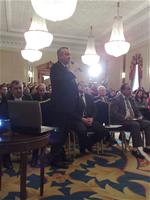 growing up after the changes the Lisbon Treaty introduced. When she was asked about the situation with the Shanghai Cooperation organisation and whether it was open to new members, Fu Ying said that there must be caution in terms of new members, because they could create a lot of problems. It would be best if an organisation consists of states sharing equal values. Then it will be solid and effective. The more it expands, the more ineffective it becomes.
growing up after the changes the Lisbon Treaty introduced. When she was asked about the situation with the Shanghai Cooperation organisation and whether it was open to new members, Fu Ying said that there must be caution in terms of new members, because they could create a lot of problems. It would be best if an organisation consists of states sharing equal values. Then it will be solid and effective. The more it expands, the more ineffective it becomes.
And while Fu Ying was telling this with a smile I could not stop wondering whether she meant the European Union and its latest enlargements that lead to the severe problems in the eurozone at the moment and also to the stumbling of Bulgaria's and Romania's accession to Schengen. And, although she admired the long history of Bulgaria after she had visited the National Museum of History, I thought that in spite of our long history we still have a lot to learn from the descendants of the Sub-celestial empire, the inventors of paper and calligraphy and from those who do not pull fruit trees in order to deliver fruit faster but take care of them and learn all the time. And it is good to learn to understand them too in order to know whether China is a threat or not.
Afterword
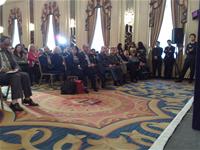 By the way, all the time I was torn by the thought why was Fu Ying in Bulgaria. From the Ministry of Foreign Affairs I was told that Bulgaria was a stop in her tour of Europe and that she had consultations in Sofia with her counterpart - deputy foreign minister Dimitar Tsanchev. Her visit was planned long ago but it is still not clear whether it was just to know China's European partners or something else. And another small detail - her visit and lecture coincided with a big article in the European edition of China Daily of China's ambassador to the European Union Song Zhe. The article is entitled "China and EU: Moving forward together" and generally overlaps with what Fu Ying said when visiting the newest member of the European Union - Bulgaria.
By the way, all the time I was torn by the thought why was Fu Ying in Bulgaria. From the Ministry of Foreign Affairs I was told that Bulgaria was a stop in her tour of Europe and that she had consultations in Sofia with her counterpart - deputy foreign minister Dimitar Tsanchev. Her visit was planned long ago but it is still not clear whether it was just to know China's European partners or something else. And another small detail - her visit and lecture coincided with a big article in the European edition of China Daily of China's ambassador to the European Union Song Zhe. The article is entitled "China and EU: Moving forward together" and generally overlaps with what Fu Ying said when visiting the newest member of the European Union - Bulgaria.
Among the main tasks in the Sino-European agenda, His Excellency outlines: "People in China feel that when talking to EU institutions and member states, we get different answers and voices. We talk with member states a lot about cooperation and deals, whereas our conversations with the institutions are invariably heavily loaded with problems and concerns, which have seriously jeopardized China-EU ties and run against what we hoped for in our relations. We support stronger policy coordination between our counterparts so that Europe can engage in a positive dialogue with China with one voice". A recommendation that needs no comment.